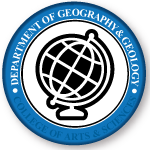Document Type
Article
Publication Date
5-13-2021
Publication Title
International Geology Review
Volume
64
Issue
7
First Page
1009
Last Page
1031
DOI
https://doi-org.leo.lib.unomaha.edu/10.1080/00206814.2021.1904297
Abstract
Afghanistan comprises a collage of many lithotectonic domains sutured together as block terranes on the southern Eurasian Plate by collisional tectonics throughout the Proterozoic and Phanerozoic. Kabul basement rocks are fragments of an Archaean block stabilized in early Precambrian with two later metamorphic events correlating well with global-scale orogenies related to assembly of the Paleoproterozoic Columbia and Neoproterozoic Rodinia supercontinents. These collisional tectonics were followed by igneous episodes and production of multiple ophiolite suites divided into three orogenic episodes of the later Palaeozoic (Devonian – Permian) Variscan (Hercynian) Orogeny, the Mesozoic (Triassic – Early Cretaceous) Cimmerian Orogeny, and the dominantly Cenozoic (Late Cretaceous – Quaternary) Himalayan (Alpine) Orogeny. Variscan, Cimmerian, and Himalayan accreted blocks are separated by prominent suture and fault zones, several of which are active and a source of considerable seismic hazard, especially in eastern Afghanistan. This resulting mélange of small exotic blocks was brought about by a rifting series of narrow ribbon terranes from the Gondwana coast of the Paleotethys and Neotethys seaways. Recent revival of Afghan-led geological lithologic and geochemical assessments has led to new interpretations of tectonic history, as well as of vital surface and groundwater, and other natural resources. Recurrent droughts have decreased water supplies, which have undergone extensive contamination, along with uncontrolled over-pumping of aquifers. Increasing attention to the rich mineral resource base in the country offers solutions to chronic budgetary shortfalls.
Recommended Citation
Shroder, J. F., Eqrar, N., Waizy, H., Ahmadi, H., & Weihs, B. J. (2021). Review of the Geology of Afghanistan and its water resources. International Geology Review, 64(7), 1009–1031. https://doi-org.leo.lib.unomaha.edu/10.1080/00206814.2021.1904297
Creative Commons License

This work is licensed under a Creative Commons Attribution-Noncommercial-No Derivative Works 4.0 License.
Files over 3MB may be slow to open. For best results, right-click and select "save as..."


Comments
This is an Accepted Manuscript of an article published by Taylor & Francis in [International Geology Review] on May 13, 2021, available online: https://doi-org.leo.lib.unomaha.edu/10.1080/00206814.2021.1904297